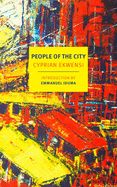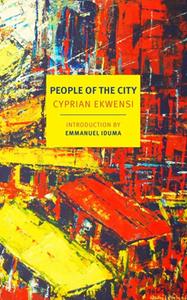
 Although Chinua Achebe's pivotal Things Fall Apart is a staple on most Western students' reading lists as representative of modern African literature, Cyprian Ekwensi predates Achebe by four years as one of Nigeria's first writers publishing in English. Introduced in the U.K. in 1954, Ekwensi's debut novel, People of the City, arrives on U.S. shelves in a handsome new edition. Despite the book's age, the perennial everyman narrative proves equally affecting for contemporary audiences: Ekwensi's (anti-)hero distances himself from his provincial background ambitiously to pursue the rewards of a quickly changing urban life.
Although Chinua Achebe's pivotal Things Fall Apart is a staple on most Western students' reading lists as representative of modern African literature, Cyprian Ekwensi predates Achebe by four years as one of Nigeria's first writers publishing in English. Introduced in the U.K. in 1954, Ekwensi's debut novel, People of the City, arrives on U.S. shelves in a handsome new edition. Despite the book's age, the perennial everyman narrative proves equally affecting for contemporary audiences: Ekwensi's (anti-)hero distances himself from his provincial background ambitiously to pursue the rewards of a quickly changing urban life.
Amusa Sango is "a most colourful and eligible young bachelor" who lives, works, plays--and too easily loves--in a "famous West African city (which shall be nameless)" not unlike Lagos. Although he diligently works two jobs, as a crime reporter for a city paper and a dance-band leader at a club, he is rarely solvent. As an only son, what little he earns must also be shared with his widowed mother, who constantly reminds him of her "anxiety that Sango had to work so far away from home... in a city to which she had never been." While chasing stories of violent deaths and seeking opportunities to make music, Sango's careless choices in companionship do not serve him well. One friend's dangerous shenanigans first get Sango evicted from his modest lodgings, and later cause a detrimental impact to his journalism career. He's long been engaged to a naïve fiancée sequestered in a rural convent, who remains unaware of his reckless affairs. True love eventually catches him off-guard, but a happy ending is hardly guaranteed.
In an introduction both personally revealing and contextually enlightening, Nigerian author, editor and art critic Emmanuel Iduma (A Stranger's Pose), who teaches writing at New York's School of Visual Arts, restores Ekwensi's historical literary prominence. Iduma opens with his own chuckle-inducing (mis)adventures of "filching a worn copy of People of the City," then "lifting entire paragraphs" as a new writer at age 15, and highlights Ekwensi's peripatetic, prolific career. A writer who produced more than 40 titles before his death in 2007, Ekwensi was also a pharmacist, radio broadcaster, professor and diplomat. Most thoughtfully, Iduma underscores Ekwensi's crucial legacy as a progenitor to "any Nigerian writer who has tried to write about Lagos as a city with feeling," including Sefi Atta, Teju Cole and Chris Abani. Iduma helps renew Ekwensi's People of the City, still inspirationally relevant, for an overdue global closeup. --Terry Hong, Smithsonian BookDragon
Shelf Talker: Prolific, historically significant Nigerian author Cyprian Ekwensi's debut novel, part of the African canon, appears in a handsome, new U.S. edition.

